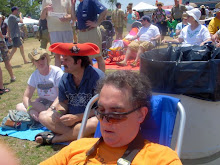What Lawyers Should Know About the Jury System
I am currently reading Prof. Nancy S. Marder's recent book The Jury Process, published by Foundation Press, now part of the Thomson/West legal publishing empire.
This book is intended as an introduction, and succeeds admirably at that task. As is necessary in a work of only 279 pages, Marder at times can present only an overview. She covers the history of the jury system, for example, in sixteen small pages. As such, The Jury Process does not have the depth of, for example, Randolph N. Jonakait's The American Jury System.
Unlike Prof. Marder's work, Prof. Jonakait's book was not intended as a law school textbook. While it undoubtedly will find its way into classrooms, it is neither organized nor written for textbook use. The Jury Process, on the other hand, is intended to serve with other materials in a law school course. A small paperback, the book is a good read for those interested in the subject.
While the book is an excellent introduction to the jury system, what is surprising is that this is the only book on the jury system written specifically for use as a law-school textbook. One would think anyone interested in being a trial lawyer would study the jury voraciously. One would be wrong.
Few law schools offer courses on the jury. While courses on tax, evidence, procedure, business associations, trial skills, white collar crime, etc., are standard fare (and there are dozens of books on any of these topics), most law schools offer no class on the history, purpose, or social science of the jury.
Many law professors speak condescendingly of jurors - probably because they've never seen one. Few law professors have ever been trial lawyers. Even fewer have been really good ones. Should we be surprised so few lawyers know more about the jury than they do? In fact, anyone who has ever served as a juror probably knows more about the workings of the jury system than the average lawyer.
While Prof. Marder's book is an excellent choice for a law school looking to add a course on the jury to its curriculum, what is sad is that this book has no competition. This is an important topic, which anyone interested in trial work ignores only at his or her peril.
Jurygeek hopes that Prof. Marder's book will sell well enough to inspire competition in the law-school textbook market. I applaud Prof. Marder for bravely going where no law school professor has dared go before, and I hope that this book is a harbinger of a full-blown casebook (with a generous section on the social sciences) to come.


0 Comments:
Post a Comment
<< Home